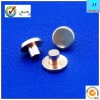- Contact Person : Mr. Gao Charles
- Company Name : Wujiang Huajun Electrical Alloy Co., Ltd.
- Tel : 86-512-63682858
- Fax : 86-512-63682868
- Address : Jiangsu,Wujiang,Longnan Village,Meiyan,Pingwang Town, Wujiang
- Country/Region : China
- Zip : 215225
silver contacts for swithes
silver contacts for swithes
Contact type: rivet/button. According to customers engineer drawing
Face material: Solid or bimetal Ag,AgNi,AgCdO,AgSnO2,AgSnO2InO3,AgZnO
Base material: Cu, CuNi Normal: 1.0mm-8.0mm, According to customers drawing or sample
silver thickness: 0.15mm-solid Normal: 0.6-4.0mm Other: according to customers requirement
Silver rivet and Ag/Cu bimetal rivet:
Specifications of bi-metal contact rivets:
1. Head diameter: 2.2-8mm
2. Shank diameter: 1.2-4mm
3. Silver layer: Min. 0.20mm
4. Shank length: <=6mm
Pure silver has a high level of electrical and thermal conductivity, good plasticity and arc corrosion resistance, as well as a very low contact resistance. It is easily soldered and is the ideal contactor material for continuous, enclosed electric connectors. It is one of the most widely used materials in small capacity and low voltage electrical appliances, such as automatic control switches, thermostats, baking machines, oven, timers, thermal relays, and computers.AgCu rivet:
This contact has good electrical conductivity and its surface is not liable to oxidization. The addition of 3 - 28% copper may remarkably improve the silver's flame resistance. Hence, copper contact material may be used in current strength up to 16A. The addition of copper, especially of high copper content, for example 10%, will greatly reduce material transferring during DC working conditions. It is widely used in AC contactors, relays, electric tool switches, buttons, timers, and other household electrical appliances.
AgNi /Cu bimetal rivet:
In low voltage engineering, this contact is widely used in AC switches as an electrical contact. Its advantages include that it may be directly soldered to contact bridges, without the need for additional solder layers, thus making manufacturing of contactor components simple and economical.
AgCdO/Cu bimetal rivet:
This contact includes AgCdO10, AgCdO12, AgCdO15, and this kind of electrical contact has one of the most important materials in silver - metal oxide contact material. The fine CdO gives the contact special properties. When the temperature is above900oC, CdO sublimes, which cools the contactor surface and reduces arc energy and extinguishments. In addition, existence of cadmium oxide will improve the welding resistance of the contactor. Its typical applications include low voltage contactors, relays, automatic switch flash relays, auxiliary switch series, timers, starters, breakers and leakage protective switches. AgZnO rivet and AgZnO/Cu bimetal rivet:
The oxide of this contactor is more thermally stable than CdO. Because of the higher stability of ZnO and AgZnO, the contactor material increases the contactor resistance, which would be compensated through structural means, such as a higher contacting force. AgSnO2 and AgSnO2 In2O3 and bimetal rivet: AgSnO2 and AgSnO2In2O3 are the ideal environment-protecting materials for substituting AgCdO. Since SnO2 has better thermal stability and higher hardness than CdO, AgSnO2 and AgSnO2 In2O3 is higher and it is more difficult to processing these two materials.
silver contacts for swithes










